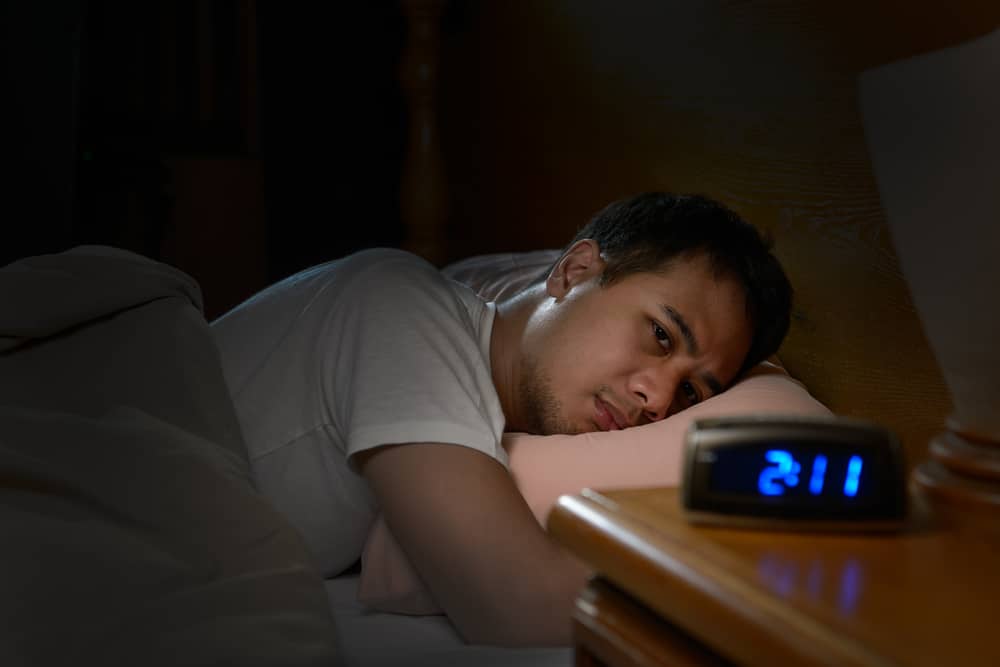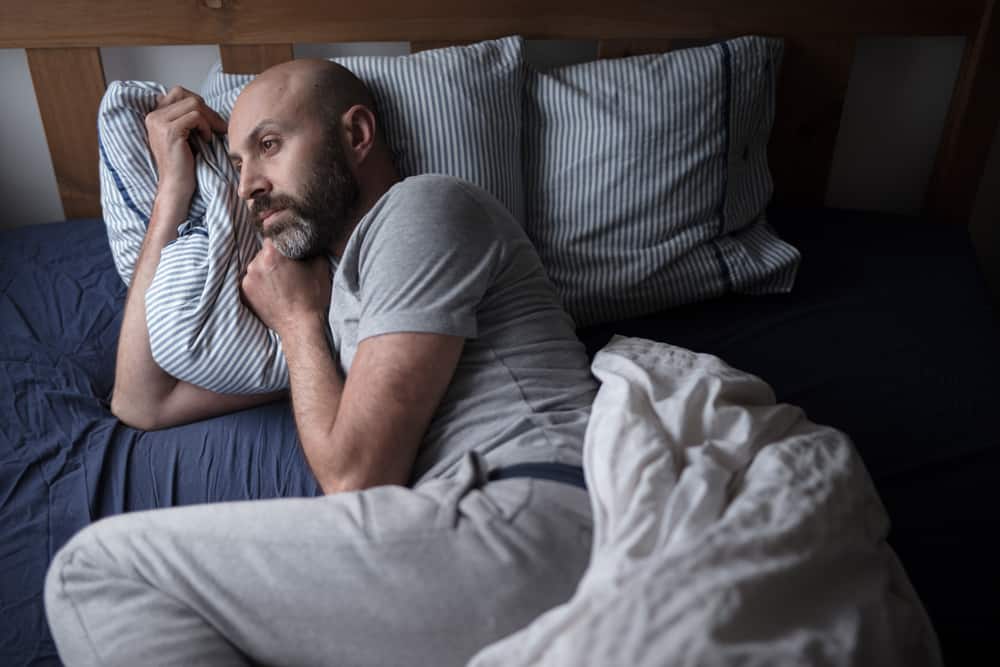No matter how tired you may be feeling when heading to bed, if you find yourself struggling to fall asleep or to stay asleep through the night, or wake at regular intervals or earlier than you normally would, you may be struggling from a very common sleep problem called insomnia.
Insomnia, especially chronic insomnia, can wreak havoc with your body in more ways than one and can affect your quality of life. Feeling un-refreshed or un-restored in the morning after waking can largely affect your mood, energy levels and your ability to go about your day as you normally would. Alongside your personal physical and mental health, insomnia may also impact your ability to focus and perform at school, university and/or work and can reduce reaction time. It may leave you feeling sleepy and irritable as your day progresses.
Short term (what is referred to as ‘acute’) insomnia is often experienced by a number of adults at certain points in life as a result of trauma or high stress. This type of insomnia may last for a few days or weeks. Long-term insomnia (or ‘chronic’ insomnia) on the other hand is insomnia that occurs for a month plus (a minimum of three nights every week). Chronic insomnia can be a contributing factor in and put you at higher risk of developing a number of different health issues, including anxiety, depression, heart disease and high-blood pressure.
Symptoms Of Insomnia
If you are suffering from insomnia, you may find yourself experiencing one or more of the following symptoms:
- trouble falling asleep when going to bed, even if feeling very tired
- waking up regularly throughout the night and having difficulty getting back to sleep
- waking up extra early
- not feeling refreshed or restored after waking
- feeling tired, sleepy and/or drowsy over the day
- feeling irritable, flat or anxious
- trouble remembering, focusing or concentrating throughout the day
- clumsiness, reduced reaction time and/or increased errors or mistakes
- feeling worried about sleep
What Is Causing My Insomnia?
Insomnia has a wide array of causes, including stress, trauma, mental health illness, physical illness, sleep disorders, snoring, medications, lifestyle factors, eating and drinking habits, poor and/or inconsistent sleeping habits, aging and menopause (as shall be discussed below). Insomnia can be the primary issue at hand (primary insomnia), or a person may be struggling with secondary insomnia (i.e. that caused by another health condition and/or lifestyle habit, etc.). The underlying cause(s) of insomnia for one person often differ to that of the next.
Sleep is just as important for our overall health as is a nutritious, well-balanced diet alongside regular exercise. It can be of great assistance to get a solid understanding of what is causing your insomnia, in order for you to be able to address it and get a solid night’s sleep on a regular basis. Let’s now take a closer look at some of the many different causes of insomnia.
Causes Of Insomnia
Stress
Laying in bed at night concerned about something that has happened or is to come, whether it’s in relation to our health, spouse, family, friends, living environment, work, schooling, finances or other, can prevent you from falling to sleep with ease or within a reasonable amount of time and can contribute to insomnia. Stress can be in regard to positive (as well as negative) events, for example, buying a property or planning an upcoming wedding.
Trauma
Trauma may affect a person following a particularly distressing or life-threatening experience or event and can interfere with our ability to get sufficient sleep in order to feel our best. Examples of traumatic experiences include personal serious illness, a traumatic childbirth, illness or death of someone we love, a relationship breakdown or divorce, being made redundant or losing our job or being a victim of or witnessing violence, war or natural disaster. A person suffering from trauma-induced insomnia may be battling Post-Traumatic Stress Disorder (PTSD) and may also struggle with anxiety and/or depression.
Mental Health Illness
A wide variety of mental health illnesses can have a negative impact on our sleep, including anxiety, depression, PTSD, Obsessive Compulsive Disorder (OCD), bipolar disorder and schizophrenia. Similarly, insomnia can also worsen the symptoms of mental health illness.
Depression
Insomnia is often linked to depression. It is not uncommon for a person suffering from depression to have difficulty falling or staying asleep, or to wake up too early. (On the other end of the scale, some individuals battling depression in fact sleep too much). As the day progresses, a lack of sleep due to insomnia can also cause mood changes in an individual with depression, as well as reduced energy levels, motivation and interest in particular activities.
Anxiety
It is no wonder that a person suffering from anxiety can have trouble sleeping, as chronic worrying and the quietness that is often present late in the evening can cause us to lay in bed ruminating, therefore delaying sleep and/or causing us to wake often and being unable to achieve a deep, quality sleep.
When our sleep is affected over a period of time, a person can develop further feelings of anxiety due to fear of not being able to sleep. As a result, insomnia and anxiety can repeatedly influence one another (similar to the way insomnia and depression are linked).
Physical Illness
A number of different physical medical conditions exist whereby insomnia may be a problem (whether caused by the condition itself or symptoms of the illness disrupt a person’s ability to sleep). Some of these illnesses include mild ailments, such as the common cold, and others are of a more serious nature, such as heart disease.
Physical illnesses that may affect a person’s ability to sleep well overnight include the following: allergies (e.g. causing itching or nasal/sinus congestion), arthritis, asthma, back pain, cancer, diabetes, fibromyalgia, gastroesophageal reflux disease (GERD), heart disease, hyperthyroidism, kidney disease and neurological diseases (e.g. Alzheimer’s and Parkinson’s diseases).
Any medical condition that leaves you feeling uncomfortable due to pain can largely interfere with your ability to fall asleep and may also cause you to wake often. Examples of such conditions include fibromyalgia, arthritis and back pain.
Sleep Disorders
Despite insomnia being a sleep disorder in itself (i.e. primary insomnia), insomnia can also affect a person’s ability to sleep adequately due to being a symptom of other sleep disorders. Other common sleep disorders that may cause a person to suffer from insomnia include restless legs syndrome and sleep apnea.
Restless Legs Syndrome (RLS) is a neurological disorder which causes a person to experience uncomfortable sensations in and therefore the requirement to move their legs to relieve the discomfort. As a result, RLS can disrupt a person’s ability to easily fall and stay asleep.
Sleep apnea occurs where an individual stops breathing (due to a partial or complete obstruction of the airway) and hence wakes up in order to satisfy oxygen supply again. The more regularly breathing stops, the higher the likelihood of reduced ability to sleep soundly and consistently (i.e. in some cases, resulting in insomnia).
Snoring
Whether it be your own snoring that is causing you to wake overnight (in order to get sufficient air back into the lungs), or the noise of your partner snoring, snoring can contribute to insomnia and an inability to sleep steadily throughout the night. Sometimes we snore and we are not aware of it until our partner or family members (or other person whom hears us through the night) makes us aware it is occurring.
Medications
Whether purchased over the counter or via prescription from a medical professional, a number of different medications can interrupt a person’s ability to sleep soundly overnight. Medications taken for medical conditions including allergies, asthma, the common cold, depression, heart disease, high blood pressure, thyroid disease as well as some contraceptive pills can interfere with sleep.
Medications can interfere with sleep for a variety of reasons, such as their makeup (e.g. alcohol, hormones, steroids, stimulants) and function (e.g. diuretics) and whether they interfere with or disrupt natural processes of the body such as the production of melatonin.
Lifestyle Factors
Problems sleeping or insomnia can be influenced by your lifestyle habits. The following are some examples of how the way you live can have a negative impact on your ability to sleep well:
- Inconsistent Schedule/Disturbed Circadian Rhythm: Shift work and/or regular travel (including jet lag) can result in a disturbed circadian rhythm (i.e. body clock) and cause you to have trouble both falling asleep and waking up/remaining awake at consistent times.
- Working Or Exercising In The Evening: Working on your laptop (or by other means) whether in the office or at home late into the evening and/or exercising late at night can make it difficult for your body and mind to unwind, not to mention the blue light from any screens keeping your brain awake and alert.
Eating And Drinking Habits
If you find yourself affected by insomnia and are not sure why, it can help to take a look at your eating and drinking habits, particularly in the evening and close to bedtime.
- Heavy Meals: It can come as a surprise to some of us that consuming a heavy meal (such as a large, greasy and/or spicy meal) before bed can contribute to sleeping difficulties, as your body is busy trying to digest your meal. Eating a light meal close to bedtime (if you must) can help to prevent you laying in bed awake with a “full” tummy, indigestion or heartburn/reflux.
- Caffeine: Many people are familiar with the fact that caffeine is a stimulant and hence many of us look forward to a coffee in the morning in order to get us going. But did you know caffeine is in other food and beverages too? These include many varieties of tea (particularly black and green teas), some soft drinks and even chocolate. Consuming excessive amounts of caffeine close to bed time is not recommended as it can prevent you from falling asleep with ease.
- Alcohol: Despite the fact that alcohol is a sedative and may assist you to fall asleep when you head to bed, it can in fact interrupt your sleep throughout the night and stop you from achieving a deep, sound sleep.
Despite not being a food or drink, it also worth mentioning that nicotine like caffeine, is likewise a stimulant and can keep you awake at night and/or prevent you from sleeping well overnight.
Poor And/Or Inconsistent Sleep Habits
If your sleep hygiene (i.e. your sleep habits) are inconsistent, it often follows that so is your sleep. Poor sleep hygiene can involve a number of factors such as sleeping in in the morning, napping during the day, changing bed times, exposing your eyes (and brain!) to blue light from devices right up until you go to sleep, the wrong sleep environment (re: your bedroom, bed/bedding, temperature, light and noise sources, etc.), just to name a few. Poor sleep hygiene can contribute to insomnia in some cases.
Aging
It is not uncommon for people to have trouble sleeping at times as we grow older. This can be due to a variety of different reasons, such as becoming a “lighter” sleeper, increasing health issues (such as sleep apnea, arthritis or bladder problems) and/or consuming a larger number of prescription drugs than in the past.
Menopause
It is not uncommon for a woman experiencing menopause to complain of sleeping difficulties such as insomnia, whether it be due to changing hormones, medications and/or hot flushes/night sweats.
Identifying and then addressing the cause(s) of your insomnia or that of a loved one can help to get you on your way to a better night’s sleep. As you can see, insomnia can be primary (i.e. a sleep disorder in itself) or a symptom of something else (i.e. secondary insomnia), whether it be stress, trauma, mental health illness, physical illness, sleep disorders, snoring, medications, lifestyle factors, eating and drinking habits, poor and/or inconsistent sleeping habits, aging, menopause or other.
If you are struggling with insomnia on a regular basis, it is very important for you to seek professional help – not only for you to work to getting a good night’s sleep once more, but also for your overall physical, mental and emotional wellbeing. Get in touch with our friendly and experienced team at Blissiree Pty Ltd for assistance with your insomnia to get you back to feeling rested and energetic once more.





